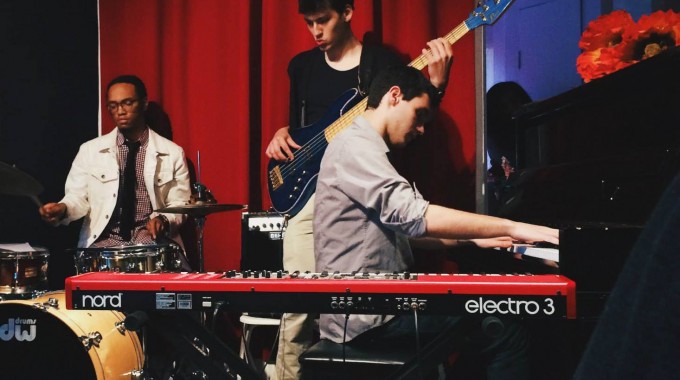If you know of a Columbia College student, faculty member, alumnus/alumna or program we should spotlight, or if you would like to submit a story, please contact:
Columbia College
Office of Communications
cc-comms@columbia.edu

“I wound up pushing myself to figure out what the Aeneid means to me far more than I would have if I had written the paper.” – Paul Bloom CC’17
With the encouragement of his Literature Humanities professor, Paul Bloom CC’17 opted to compose and perform “The Aeneid: A Musical Retelling” in April 2014, in lieu of a final paper for his Spring 2014 Literature Humanities class.
To do so, Bloom assigned musical themes to each culture in the story – including Trojans, Greeks, Latins, Carthaginians, Sicilians – and manipulated these themes based on what happened to each culture to create a musical representation of the founding story of Rome and the different civilizations converging to become the Romans.
For Bloom, the opportunity to integrate his passion for music and his academic life was exciting. “By giving myself the goal of presenting an interpretation of the Aeneid in a public form, through the medium of music, I wound up pushing myself to figure out what the Aeneid means to me far more than I would have if I had written the paper,” said Bloom.
Due to the initial performance’s success, the Center for the Core Curriculum provided support for a second performance, on Feb. 6. Held in Dodge Hall Room 112, the concert was performed by Bloom on piano, along with Dayna Stephens, Connor Schultze and Jeremy Dutton. While the concert marked the first time that the four had played together as a group, Schultze, Dutton and Bloom play together regularly in their band, iiii. (iiii also includes vocalist Laila Smith.)
The second performance also connected the music to the story of the United States, including recent events in Ferguson and Staten Island.
“We think it’s really important to examine our own country through the same critical lens we use to look at history or narratives like the Aeneid,” Bloom said. “This performance referenced a bunch of American musical traditions; different types of folk music, bluegrass, blues, jazz, hip-hop, rock and R&B. We hoped that by giving a nod to these different traditions we could help musical American stories that aren't part of the ‘mainstream’ to be told.”
Bloom, who has been playing piano since age six, has been writing music since middle school, and for the past few years, has been particularly drawn to collective composition, in which artists compose music as a group rather than individually. “In the case of the Aeneid, I was the one to do the physical notation of the music, but I think that the rest of the band has had as just as much collective influence over the music as I have,” said Bloom. “Especially because there’s so much improvisation within the piece, in a sense we’re all the composers.”
Joe Blankholm GSAS’15, Bloom’s Literature Humanities instructor, said the music allowed listeners to hear the story of Rome.
“In the final book/part, the motifs culminate in a Roman motif that includes the others and thus aurally represents the bloody marriage rites that eventually constitute the Roman people,” said Blankholm. “The audience can hear Rome's inexorable destiny unfold.”
Overall, Bloom has found the experience overwhelmingly positive. “I knew from the outset that doing this project would take up much more of my time than writing a paper would,” said Bloom. “But it’s definitely been worth it for me.”
By Elena Hecht BC’09